Fayetteville Mom educates the community about dwarfism
Three-year-old Everett Stuckey has dwarfism, but he is so much more than this diagnosis. He lives in Fayetteville, Arkansas with his mom Kelly. He goes to preschool four days a week. He loves board games and playing Super Mario on his Nintendo. His favorite foods are pizza and chicken nuggets. He gets excited about having play-dates with his friends. Like most three-year-olds, he is headstrong and likes to do things his own way. Kelly says he’s smart for his age.
On top of how rare dwarfism is, there is also a lot that people don’t know and it has become kind of taboo, Kelly said. A lack of knowledge and a lack of representation in the media has led to a stigma surrounding little people.
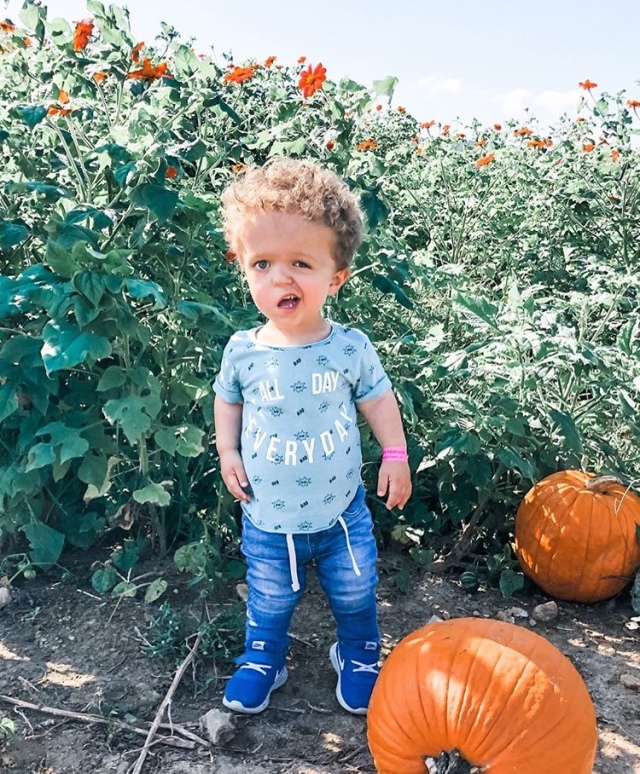
The media has told a single-story about little people for a long time. In PT Barnum’s circus, he exploited people who were different. He hired little people to perform for entertainment. Little people play Oompa Loompas in Charlie and the Chocolate factory. They play munchkins in the Wizard of Oz. Both of these are minor roles depicting mythical creatures.
Another offensive form of representation is “midget wrestling.” The Little People of America website says, “when a venue hosts midget wrestling, they are reinforcing stereotypes that portray little people as objects of entertainment.”
Last week, a nine-year-old boy with dwarfism captured global attention after his mom shared “a heartbreaking video of him in distress over being bullied,” CNN said.
When people are only represented one way in film and television, they can start to think that they are limited to that one narrative.
“You don’t see little people that often in movies, but when you do see them they are cast to be a joke or a mythical creature,” Kelly said. “I get it, it’s a small percentage, but I would love to see a few movies cast little people where there is no joke but they’re just an average person.”
She is passionate about educating people on what dwarfism is and how it impacts everyday life. One way Kelly advocates is through sharing her and Everett’s experiences on her social media page. (@hellokellystuckey)
In the mornings, Kelly drinks coffee and Everett drinks chocolate milk. Kelly has passed on her love of music to her son. If they have a slower morning, with nowhere to be, Kelly plays the piano while Everett sits in her lap. They love to dance. Everett chooses the song and Kelly holds him as they dance around the living room. She shares pictures of her and Everett to try to help people see dwarfism not as a myth or a joke, but as a regular part of life.
There are challenges in their everyday life too. Everett doesn’t have the freedom to just go outside and play like most kids his age can. He can’t reach the doorknob, so Kelly has to go with him. It was difficult for him to learn how to eat because he also has a facial palsy. He still eats slowly and that frustrates him. She worries about Everett going to middle and high school. She worries about the classrooms being far apart because it takes Everett twice as long to walk from one place to another.
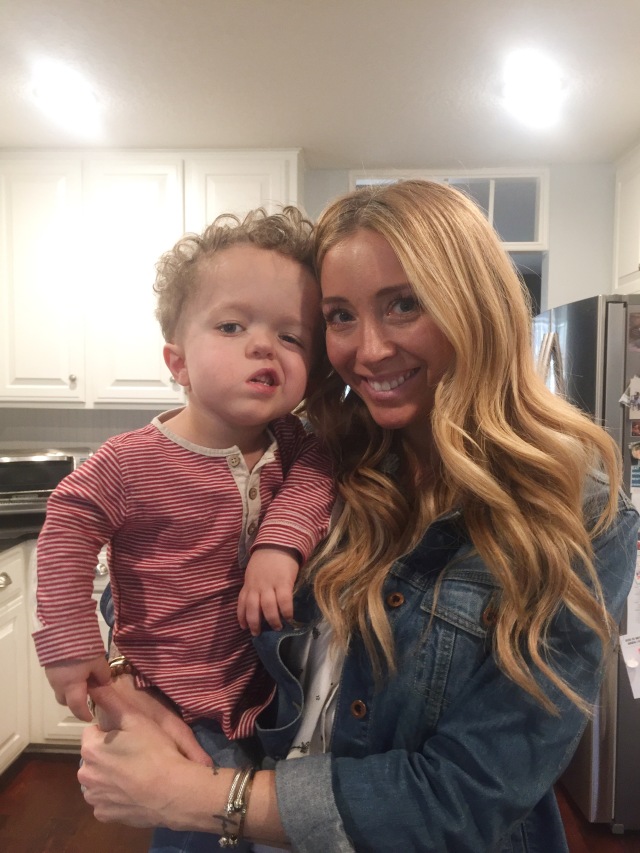
Every year Kelly sends out a letter to the parents and teachers in Everett’s preschool class. She said she wants to educate parents to have the conversation at home before they go out in public with their kids and something hurtful is said.
“But if you are out in public and something is said, don’t shush them,” Kelly said. “It is okay that they notice things are different. Use that as an opportunity to educate them instead of just sweeping it under the rug,” she said.
Kelly isn’t afraid to have conversations with strangers when they say something hurtful. She remembers starting a conversation with strangers at the airport while watching the Kentucky Derby. Two men who were sitting beside her, joking about some of the people at the derby being short and calling them midgets. They thought they were being funny, Kelly said.
Everett wasn’t with her, but she still felt compelled to say something. She interrupted and said, “I don’t want to make y’all uncomfortable but my son is a little person.”
They started asking questions like, “How do you know he won’t grow out of it?”
She explained that “midget” is a derogatory word and said that dwarfism is a bone growth disorder that people don’t grow out of. Kelly said it turned into a great conversation. The two men even started to cry. She said that most of the time when people say things like that they are uneducated and just don’t understand.
A few years ago, Kelly didn’t understand what dwarfism is either.
People with dwarfism can be born to parents of average stature. 80 percent of little people are born to average-sized parents, according to the Understanding Dwarfism website. It is difficult to detect on an ultrasound, so Kelly and her husband Zac had no idea that Everett was a little person.
Kelly had a routine pregnancy but after 46 hours of labor, the doctor knew something was wrong. People with dwarfism often have enlarged heads which can cause complications in childbirth. Because of this, Kelly had to have an emergency c-section.
After Everett was born, everything seemed fine.
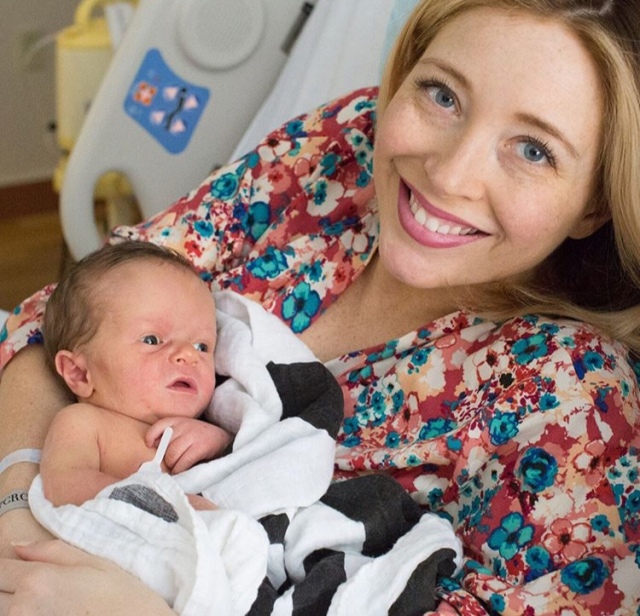
The day they were discharged from the hospital a nurse asked Kelly and Zac, “Have you noticed that your son is pretty unusual looking?” They were shocked and overwhelmed. The nurse started using these big medical terms and suggested Everett might have achondroplasia, a kind of dwarfism, Kelly said.
They thought she was wrong at first. They went to see a pediatrician and Everett had bloodwork done at five days old.
In the waiting, Zac and Kelly decided they would not do any research on dwarfism. They spent a lot of time in prayer and just taking care of their son.
“To me he is perfect and he’s beautiful and in a way, I’m glad I didn’t know about the diagnosis until after he was born,” Kelly said.
Kelly was at home in the nursery trying to feed Everett when the doctor called. The test results came back and confirmed that he did have dwarfism. Kelly said her first thought was, How is the world going to treat him? And she cried.
“I want to make sure he knows he can be what he wants to be and that he’s not limited to certain roles or jobs because of this,” Kelly said.
Peggy O’Neill was told that people would never hire her because she is a little person. Now she is an author and professional speaker who travels to schools and corporations to give speeches on inclusion and empowerment.
People need to be respected, she said. They desire to see a reflection of themselves in movies and television because that gives them a sense of belonging.
“Representation of little people is terrible,” Peggy said.
Her ex-husband, who is also a little person, was an actor and Peggy said the roles he got offered were very limited. He played elves in Christmas commercials. He was a child stand-in, who stood on the set while the producers fixed the lighting for a child actor. There were multiple times he was asked to show up to an audition in diapers, to play the role of a baby.
Peggy wants to see little people in roles where they speak, interact with other characters and have relationships. She wants to see more accurate depictions of little people.
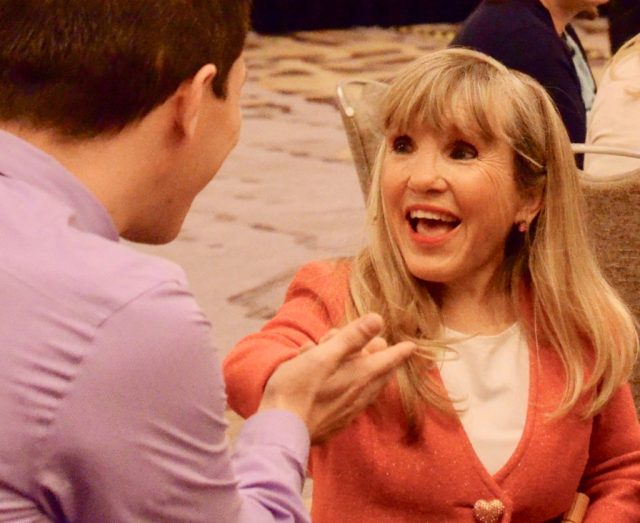
Peggy said the biggest challenge of being a little person is adapting to a world made for average-sized people. Things like telephone booths, cars, light switches and furniture are all hard for her to use.
While all of that is difficult, Peggy said the biggest challenge is the way people respond to her. She said people assume that because she is a little person, she has little intelligence.
“Everywhere you go there’s a reaction. There’s a reaction when you go to school, when you go to work and when you get up on stage to speak,” Peggy said. “People think, “Oh my gosh, this person is so different than me” and they go into a state of shock and fear.”
Everett is getting to the age where he is starting to notice these reactions. He has started to notice that he is different, so Kelly has started pointing out differences in nature to try to teach him that differences are a good thing.
“Everett, look at how many different kinds of trees there are,” she says. Kelly said she believes that everyone is created in the image of God. She said we should celebrate that we are not all the same.
She said she wants Everett to have confidence that God made him and loves him and he has a purpose. She hopes that he will find his identity in Christ rather than a diagnosis.
Kelly leans heavily on her faith, especially now that she is parenting Everett alone. Her husband Zac died in a motorcycle crash in July. Kelly said she worries about not having her husband to help her with big decisions, like where Everett will go to school in a few years. She worries about Everett having confidence, growing up without a strong father figure. “It breaks my heart that his Dad won’t be here,” she said.
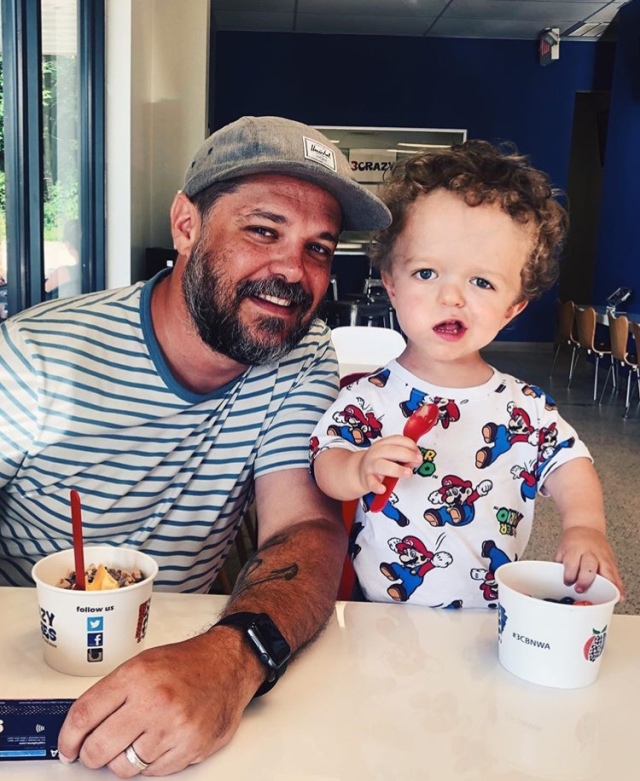
She wishes Zac was here to help Everett with hygiene. Some little people’s arms are not long enough to wash their hair properly. Even going to the bathroom can be challenging.
“Zac was always the really light-hearted and fun one and I have always been more serious. I worried really early on if I would be able to make life fun for Everett.”
Kelly said that she has male friends and family members who will help fill in the gaps, but it will never be the same without Zac.
She wrote on Instagram in September, “God’s Word tells me that he who began a good work in me will be faithful to complete it (Phil 1:6). That the Lord is near to the brokenhearted and saves the crushed in spirit (Psalm 34:18). So many promises and God has been SO NEAR & FAITHFUL. I can’t deny His presence and guidance any more than I could deny this pain. He is supplying supernatural strength to get up, show up, and bring fun and joy into Everett’s life. One day at a time.”
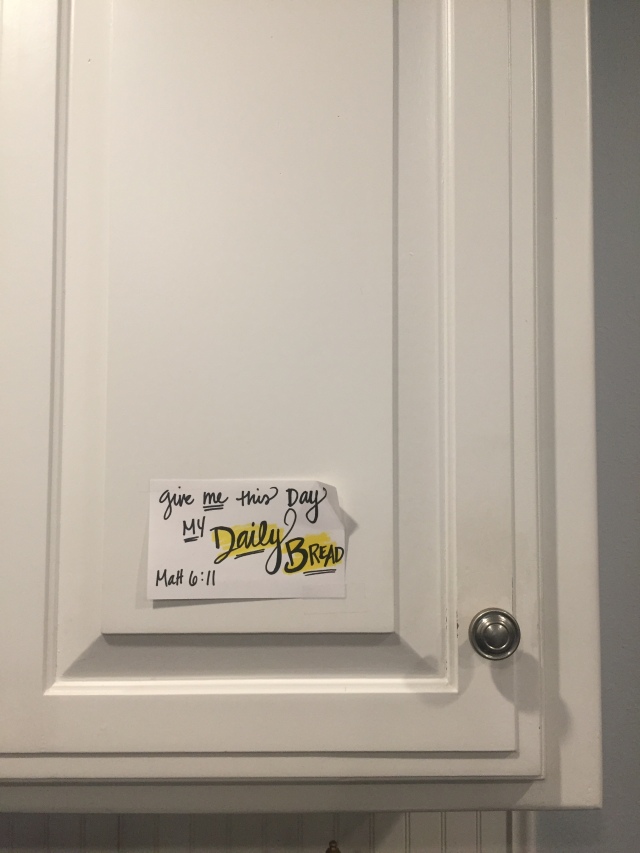
Even with this hope, Kelly said that grief has made her brain feel broken. She and Everett have both been going to counseling. She had a friend come over to help her sort through their house. She is putting together a scrapbook and saving things that belonged to Zac to give to Everett when he’s older to help him feel connected to his dad.
Kelly said she has been telling herself to “just show up.” Adjusting to life without Zac has been hard, but she keeps showing up. She shows up to her job. She shows up to be a mom. She shows up to meet with friends. She shows up to share her story and continue fighting for better representation of little people like Everett.

This is a great start! I think you can draw more of the details out. I’d be interested in learning more about her/others activism in the area and if there are specific examples of people “mistreating” or being rude to Everette. Additionally, I’d like to know more about the challenge of doing this alone after the loss of her husband. You did a good job describing Everette by giving us some of his personality without quoting him. Also loved the info about little people in movies. Can’t wait to read the final copy.
LikeLike
Nice work! I love the profile subject, you’ve got solid pictures, and what you have is well-written. I know that you plan to talk to more people, and I think the story will be more fleshed out when more perspectives are added. The part about the spinal cord decompression surgery seems to interrupt the narrative a little bit, so I would move that down. I would also go more in depth about what it was like for Kelly and Everett to lose Zac – how has this loss impacted their relationship? How has it impacted Kelly’s mission to increase awareness and acceptance of Dwarfism? Did Zac share this mission with Kelly or was it always kind of her thing? Great start!
LikeLiked by 1 person
NEEDS A HEADLINE AND DECK.
Three-year-old Everett Stuckey lives in Fayetteville, Arkansas. He goes to preschool four days a week. He loves board games and playing Super Mario on his Nintendo. His favorite foods are pizza and chicken nuggets. He gets excited about having play-dates with his friends. Like most three-year-olds, he is headstrong and likes to do things his own way. His mom Kelly says he’s smart for his age.
Everett is also a little person. THERE ARE GOOD DETAILS HERE, BUT LET’S AVOID BLIND LEDES, WHICH WE DISCUSSED IN FEATURE WRITING. THE READER WILL HAVE READ THE HEADLINE AND DECK SO IT WILL BE NO BIG SURPRISE THAT EVERETT IS A LITTLE PERSON. JUST DIVE INTO IT WITHOUT PLAYING GAMES WITH THE READER
IMG_6642
Everett stands in a pumpkin patch on October 24. GIVE SECOND SENTENCE WITH CONTEXT. TIE THIS TO THE ANGLE OF STORY. Photo courtesy of Kelly Stuckey.
DONT’ NEED THIS JUST YET. MOST PEOPLE HAVE A WORKING KNOWLEDGE OF DWARFISM. TELL US INSTEAD THE ANGLE FO STORY. WHAT ARE YOU SAYING ABOUT EVERETT OR HIS MOM
Dwarfism is a rare bone growth disorder, caused by a spontaneous genetic mutation. It causes people to have smaller arms and legs in relation to their torso. People with dwarfism can be born to parents of average stature. It is difficult to detect on an ultrasound, so Kelly and her husband Zac had no idea that Everett was a little person.
BEFORE WE GET TO THIS, WE NEED NUT GRAF. THEME/ANGLE OF STORY
Kelly had a routine pregnancy but after 46 hours of labor, the doctor knew something was wrong. People with dwarfism often have enlarged heads which can cause complications in childbirth. Because of this, Kelly had to have an emergency c-section. CAN MOVE THIS DOWN. NEED ANGLE.PERHAPS THE FOCUS IS ON KELLY
After Everett was born, everything seemed normal.
The day they were discharged from the hospital a nurse asked Kelly and Zac, CAPITALIZE: “have you noticed that your son is pretty unusual looking?” They were shocked and overwhelmed. The nurse started using these big medical terms and suggested Everett might have achondroplasia, Kelly said. WORK KELLY’S AGE INTO STORY
They thought she was wrong at first. They went to see a pediatrician and Everett had bloodwork done at five days old.
In the waiting, Zac and Kelly decided they would not do any research on Dwarfism. They spent a lot of time in prayer and focused on just taking care of their son.
For newborns, the biggest risk is spinal cord compression. Their cartilage doesn’t grow into bone fast enough. At the base of the skull, there’s an opening where the spinal cord meets the brain stem, and it doesn’t grow wide enough to support the head. Everett needed spinal cord decompression surgery at just over a year old.
Kelly was at home in the nursery trying to feed Everett when the doctor called. The test results came back and confirmed that he did have I THINK THIS IS LOWER CASE: Dwarfism. Kelly said her first thought was, how is the world going to treat him? And she cried.
On top of being so rare, there is also a lot that people don’t know about dwarfism and it has become kind of taboo, Kelly said. A lack of knowledge about dwarfism and a lack of representation has led to a stigma around it.
In PT Barnum’s circus, he exploited people who were different. He hired little people to perform for entertainment. Little people play Oompa Loompas in Charlie and the Chocolate factory. They play munchkins in the Wizard of Oz. Both of these are minor roles depicting mythical creatures. OKAY, THIS IS A START. BUILD THIS OUT AND MOVE TO NUT GRAF, UP IN STORY
“You don’t see little people that often in movies, but when you do see them they are cast to be a joke or a mythical creature,” Kelly said. “I get it, it’s a small percentage, but I would love to see a few movies cast little people where there is no joke but they’re just an average person.” GOOD
When people are only represented one way in film and television, they can start to think that they are narrowed to that one narrative.
“I want to make sure he knows he can be what he wants to be and that he’s not limited to certain roles or jobs because of this,” Kelly said. She is also passionate about educating others about Dwarfism. One way she does this is through sharing her experience on social media. I want to do our part to show people what real life is like with Dwarfism, Kelly said. IF YOU’RE USING THE PRONOUN “I” IT NEEDS TO BE IN QUOTES. IF YOU’RE PARAPHRASING USE THIRD PERSON
In the mornings, Kelly drinks coffee and Everett drinks chocolate milk. Kelly has passed on her love of music to her son. If they have a slower morning, with nowhere to be, Kelly plays the piano while Everett sits in her lap. They love to dance. Everett chooses the song and Kelly holds him as they dance around the living room. There are still challenges. Everett can’t just go outside and play because he can’t reach the doorknob. Kelly worries about him falling because of his low muscle tone and an enlarged head. Walking upstairs takes twice as long. But Kelly hopes that by sharing parts of their everyday life she can begin to remove the stigma surrounding dwarfism.
“To me he is perfect and he’s beautiful and in a way, I’m glad I didn’t know about the diagnosis until after he was born,” Kelly said.
05949956-0D7E-4609-AAA0-41258D99EDF7
Kelly holds Everett in their kitchen at home. GIVE TOWN. AND SECOND SENTENCE Photo by Mary Katherine Shapiro.
Every year she sends out a letter to the parents and teachers in Everett’s preschool class. Kelly said she wants to educate parents to have the conversation at home before they go out in public with their kids and something hurtful is said. EXAMPLES OF OBSTACLES?
“But if you are out in public and something is said, don’t shush them,” Kelly said. It is okay that they notice things are different. Use that as an opportunity to educate them instead of just sweeping it under the rug, she said.GOOD.
INSERT AIRPORT STORY HERE
She has started pointing out differences in nature when she is out with Everett.
“Everett, look at how many different kinds of trees there are,” she says.
She wants him to have confidence that God made him and loves him and he has a purpose. She hopes that he will find his identity in Christ rather than a diagnosis. Kelly leans heavily on her faith in parenting Everett, even after the loss of her husband six months ago. AVOID EUPHEMISMS. DID HE DIE?
“God’s Word tells me that he who began a good work in me will be faithful to complete it (Phil 1:6). That the Lord is near to the brokenhearted and saves the crushed in spirit (Psalm 34:18). So many promises and God has been SO NEAR & FAITHFUL. I can’t deny His presence and guidance any more than I could deny this pain. He is supplying supernatural strength to get up, show up, and bring fun and joy into Everett’s life. One day at a time,” she wrote on Instagram in September.
IMG_6619
Kelly has Bible verses taped up around her home. Photo by Mary Katherine Shapiro.
Being a single mom is challenging. Being a single mom of a little person has additional challenges. She worries about Everett having confidence, growing up without a strong father figure. She worries about not having her husband to talk things out with when it comes to making big decisions about Everett’s future. She worries about Everett’s arms being long enough to wash his hair when he gets older. THIS IS GOOD. MORE LIKE THIS She worries about him going to middle and high school. She worries about the classrooms being far apart and Everett struggling to walk across the big campuses.
IT’S NOT DONE YET I HAVE MORE TO ADD
THE WRITING IS CLEAN BUT I WAS HOPING TO SEE MORE REPORTING THAN THIS FOR THE DRAFT. MOST IMPORTANT IS FINDING THE ANGLE AND THE SOURCES THAT WILL ALLOW YOU TO BUILD IT OUT.
I LOOK FORWARD TO YOUR REVISION.
LikeLike
Fayetteville Mom educates the community about dwarfism
Three-year-old Everett Stuckey has dwarfism, but he is so much more than this diagnosis. I LIKE THAT YOU’RE NOT TRYING TO SURPRISE US WITH HIS CONDITION BUT WE NEED A SHARPER ANGLE, ONE MORE SPECIFIC TO HIM. YOU CAN SAY THIS OF ANYONE.
He lives in Fayetteville, Arkansas with his mom Kelly. He goes to preschool four days a week. He loves board games and playing Super Mario on his Nintendo. His favorite foods are pizza and chicken nuggets. He gets excited about having play-dates with his friends. Like most three-year-olds, he is headstrong and likes to do things his own way. Kelly says he’s smart for his age.
On top of how rare dwarfism is, HOW RARE? there is also a lot that people don’t know COULD BE SAID OF MANY THINGS and it has become kind of taboo, Kelly said. TABOO IS INTERESTING. MAYBE START WITH THAT. A lack of knowledge and a lack of representation in the media has led to a stigma surrounding little people.
IMG_6642
Everett Stuckey stands in a pumpkin patch. Dwarfism causes people to have shorter arms and legs in relation to their torso and an enlarged head. Photo courtesy of Kelly Stuckey.
The media has told a WHY THE HYPHEN? single-story about little people for a long time. In PT Barnum’s circus,
CUT: he exploited people who were different.
GIVE MORE DETAILS: He hired little people to perform for entertainment. Little people play Oompa Loompas in Charlie and the Chocolate factory. They play munchkins in the Wizard of Oz. Both of these are minor roles depicting mythical creatures. GOOD. WE NEED SOME LITERATURE ABOUT THIS. HAS ANYONE WRITTEN ABOUT THE MEDIA PORTRAYALS OF DWARFISM?
Another offensive form of representation is “midget wrestling.” The Little People of America website says, “when a venue hosts midget wrestling, they are reinforcing stereotypes that portray little people as objects of entertainment.” GOOD.
Last week, a nine-year-old boy with dwarfism captured global attention after his mom shared “a heartbreaking video of him in distress over being bullied,” CNN said. WHO SAID THIS ON CNN? IS THIS A HEADLINE? OR DID A REPORTER SAY THIS? CNN SAID IS LIKE SAYING THE GOVERNMENT SAID. NEED A SPECIFIC PERSON
GIVE MORE DETAIL/CONTEXT ON THE VIDEO AND WHY IT WENT VIRAL
I LIKE THESE MEDIA EXAMPLES BUT WE NEED MORE ABOUT HOW/WHY THEY EXIST. GET US AN EXPERT
IS THERE ANYTHING NEW GOING ON WITH THIS? LIKE IT’S SOMEHOW BUBBLED UP IN POPULAR CULTURE IN SOME WAY OR NEW RESEARCH?
When people are only represented one way in film and television, they can start to think that they are limited to that one narrative.
BEFORE WE GET HERE TELL US THAT SHE’S TRYING TO PREVENT HER CHILD FROM BEING HURT BY THESE STEREOTYPES
“You don’t see little people that often in movies, but when you do see them they are cast to be a joke or a mythical creature,” Kelly said. “I get it, it’s a small percentage, but I would love to see a few movies cast little people where there is no joke but they’re just an average person.”
She is passionate about educating people on what dwarfism is and how it impacts everyday life. One way Kelly advocates is through sharing her and Everett’s experiences on her social media page. (@hellokellystuckey)
In the mornings, Kelly drinks coffee and Everett drinks chocolate milk. Kelly has passed on her love of music to her son. If they have a slower morning, SLOWER THAN DRINKING COFFEE AND CHOCOLATE MILK? with nowhere to be, Kelly plays the piano while Everett sits in her lap. They love to dance. Everett chooses the song and Kelly holds him as they dance around the living room. She shares pictures of her and Everett to try to help people see dwarfism not as a myth or a joke, but as a regular part of life. GOOD. AND DOES SHE SHOW PICTURES OF PEOPLE WITH DWARFISM TO EVERETT?
There are challenges in their everyday life too. Everett doesn’t have the freedom to just go outside and play like most kids his age can. He can’t reach the doorknob, so Kelly has to go with him. It was difficult for him to learn how to eat because he also has a facial palsyEXPLAIN . He still eats slowly and that frustrates him. She worries about Everett going to middle and high school. She worries about the classrooms being far apart because it takes Everett twice as long to walk from one place to another.
05949956-0D7E-4609-AAA0-41258D99EDF7
Kelly Stuckey, 37, stands with her son Everett in their kitchen on February 11. They live in Fayetteville, Arkansas, where Kelly graduated college. Photo by Mary Katherine Shapiro. GOOD
Every year Kelly sends out a letter to the parents and teachers in Everett’s preschool class. She said she wants to educate parents to have the conversation at home before they go out in public with their kids and something hurtful is said.
“But if you are out in public and something is said, don’t shush them,” Kelly said. “It is okay that they notice things are different. Use that as an opportunity to educate them instead of just sweeping it under the rug,” she said.
Kelly isn’t afraid to have conversations with strangers when they say something hurtful. She remembers starting a conversation with strangers at the airport while watching the Kentucky Derby. Two men who were sitting beside her, joking about some of the people at the derby being short and calling them midgets. They thought they were being funny, Kelly said.
Everett wasn’t with her, but she still felt compelled to say something. She interrupted and said, “I don’t want to make y’all uncomfortable but my son is a little person.”
They started asking questions like, “How do you know he won’t grow out of it?” WOW.
She explained that “midget” is a derogatory word and said that dwarfism is a bone growth disorder that people don’t grow out of. Kelly said it turned into a great conversation. The two men even started to cry. She said that most of the time when people say things like that they are uneducated and just don’t understand.
A few years ago, Kelly didn’t understand what dwarfism is either.
People with dwarfism can be born to parents of average stature. 80 percent of little people are born to average-sized parents, according to the Understanding Dwarfism website. It is difficult to detect on an ultrasound, so Kelly and her husband Zac had no idea that Everett was a little person.
Kelly had a routine pregnancy but after 46 hours of labor, the doctor knew something was wrong. People with dwarfism often have enlarged heads which can cause complications in childbirth. Because of this, Kelly had to have an emergency c-section.
After Everett was born, everything seemed fine.
IMG_6979
Kelly holds Everett at Washington Regional Hospital in Fayetteville, Arkansas. He was born on April 22, 2016. Photo courtesy of Kelly Stuckey.
The day they were discharged from the hospital a nurse asked Kelly and Zac, “Have you noticed that your son is pretty unusual looking?” They were shocked and overwhelmed. The nurse started using these big medical terms and suggested Everett might have achondroplasia, a kind of dwarfism, Kelly said. TIE THIS BACK INTO THE NEED FOR A C-SECTION. COMPLETE THE THOUGHT ABOVE
They thought she was wrong at first. They went to see a pediatrician and Everett had bloodwork done at five days old.
In the waiting, Zac and Kelly decided they would not do any research on dwarfism. They spent a lot of time in prayer and just taking care of their son.
“To me he is perfect and he’s beautiful and in a way, I’m glad I didn’t know about the diagnosis until after he was born,” Kelly said.
Kelly was at home in the nursery trying to feed Everett when the doctor called. The test results came back and confirmed that he did have dwarfism. Kelly said her first thought was, How is the world going to treat him? And she cried.
“I want to make sure he knows he can be what he wants to be and that he’s not limited to certain roles or jobs because of this,” Kelly said.
Peggy O’Neill was told that people would never hire her because she is a little person. Now she is an author and professional speaker who travels to schools and corporations to give speeches on inclusion and empowerment. WHERE DOES SHE LIVE? AGE?
People need to be respected, she said. They desire to see a reflection of themselves in movies and television because that gives them a sense of belonging.
“Representation of little people is terrible,” Peggy said. IF THIS WAS OVER THE PHONE YOU SHOULD SO, JUST SO WE KNOW THAT SHE’S NOT LOCAL
Her ex-husband, who is also a little person, was an actor and Peggy said the roles he got offered were very limited. He played elves in Christmas commercials. He was a child stand-in, who stood on the set while the producers fixed the lighting for a child actor. There were multiple times he was asked to show up to an audition in diapers, to play the role of a baby. WOW. GREAT EXAMPLES.
Peggy wants to see little people in roles where they speak, interact with other characters and have relationships. She wants to see more accurate depictions of little people.
DSC_6216-1024×838
Peggy O’Neill, 64, speaks at events all across the United States. A friend encouraged her to start speaking as a profession. Photo courtesy of Peggy O’Neill.
Peggy said the biggest challenge of being a little person is adapting to a world made for average-sized people. Things like telephone booths, cars, light switches and furniture are all hard for her to use.
While all of that is difficult, Peggy said the biggest challenge is the way people respond to her. She said people assume that because she is a little person, she has little intelligence.
“Everywhere you go there’s a reaction. There’s a reaction when you go to school, when you go to work and when you get up on stage to speak,” Peggy said. “People think, “Oh my gosh, this person is so different than me” and they go into a state of shock and fear.”
Everett is getting to the age where he is starting to notice these reactions. He has started to notice that he is different, so Kelly has started pointing out differences in nature to try to teach him that differences are a good thing.
“Everett, look at how many different kinds of trees there are,” she says. THIS IS GREAT Kelly said she believes that everyone is created in the image of God. She said we should celebrate that we are not all the same.
She said she wants Everett to have confidence that God made him and loves him and he has a purpose. She hopes that he will find his identity in Christ rather than a diagnosis.
Kelly leans heavily on her faith, especially now that she is parenting Everett alone. Her husband Zac died in a motorcycle crash in July. Kelly said she worries about not having her husband to help her with big decisions, like where Everett will go to school in a few years. She worries about Everett having confidence, growing up without a strong father figure. “It breaks my heart that his Dad won’t be here,” she said. THIS IS IN THE RIGHT SPOT IN THE STORY
IMG_6955
Zac Stuckey sits with Everett at 3 Crazy Berries. Kelly said he always made their family laugh. Photo courtesy of Kelly Stuckey. GOOD TO INCLUDE
She wishes Zac was here to help Everett with hygiene. Some little people’s arms are not long enough to wash their hair properly. Even going to the bathroom can be challenging.
“Zac was always the really light-hearted and fun one and I have always been more serious. I worried really early on if I would be able to make life fun for Everett.”
Kelly said that she has male friends and family members who will help fill in the gaps, but it will never be the same without Zac.
She wrote on Instagram in September, “God’s Word tells me that he who began a good work in me will be faithful to complete it (Phil 1:6). That the Lord is near to the brokenhearted and saves the crushed in spirit (Psalm 34:18). So many promises and God has been SO NEAR & FAITHFUL. I can’t deny His presence and guidance any more than I could deny this pain. He is supplying supernatural strength to get up, show up, and bring fun and joy into Everett’s life. One day at a time.”
IMG_6619
Kelly has Bible verses all around her home. Her faith is an important aspect of her everyday life. Photo by Mary Katherine Shapiro.
Even with this hope, Kelly said that grief has made her brain feel broken. She and Everett have both been going to counseling. She had a friend come over to help her sort through their house. She is putting together a scrapbook and saving things that belonged to Zac to give to Everett when he’s older to help him feel connected to his dad.
Kelly said she has been telling herself to “just show up.” Adjusting to life without Zac has been hard, but she keeps showing up. She shows up to her job. She shows up to be a mom. She shows up to meet with friends. She shows up to share her story and continue fighting for better representation of little people like Everett.
THIS IS NICELY WRITTEN. STRUCTURE WORKS WELL. SOME GOOD POP CULTURE EXAMPLES BUT THE ANGLE STILL FEELS POORLY FLESHED OUT. ADDITIONAL SECONDARY SOURCES WIL HELP.
NEEDS A MORE POTENT KICKER.
LikeLike
This is a lot stronger and really good! I loved the other source you pulled in. Adding more information about her husband was more emotional and you tied it in nicely, especially relating to Everett. Great job MK!
LikeLike